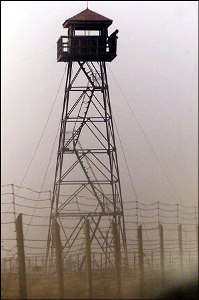Training for Law Enforcement Officers on the Turkmen-Uzbek Border
 The beginning of 2011 has been a period of extensive activity for the UNODC project 'Strengthening border control along the Turkmen-Uzbek border, in particular at Farap Checkpoint', reflecting UNODC's ongoing commitment to strengthening the capabilities of law enforcement officers in the border region. The activities undertaken have included two workshops addressing interviewing and investigation techniques respectively, along with the provision of two narcotic detection dogs and the training of their handlers. The first workshop, run from the 21
st to the 25
th of February in Turkmenabat, Turkmenistan, provided national law enforcement officers with an overview of international best practices related to interview skills and techniques. The workshop was attended by 20 officers from the State Customs Service, State Border Service, State Migrations Service, the ministries of National Security and Internal Affairs, and State Drug Control Services, who agreed to pass the material they had learnt onto their colleagues. Trainers were provided by the Turkish International Academy against Drugs and Organized Crime (TADOC). The workshop served as a forum for the discussion of widely applied and accepted practices concerning interview techniques, including methods of planning and controlling an interview. These concepts were engrained through case and group studies, allowing participants to use their skills in practical situations. UNODC also hosted a second workshop in Turkmenabat from the 28
th of March to the 1
st of April, addressing the conduction of criminal investigations which relate to commercial goods and drug trafficking cases. Attended by 14 officers from the State Customs Service, State Border Service, Ministry of Internal Affairs and State Drug Control Services, and directed by trainers from the U.S. Drug Enforcement Administration (DEA) and TADOC services, the workshop covered topics ranging from evidence collection to report writing techniques. Last but not least, UNODC has delivered two Narcotic Detector Dogs to the Turkmenistan Drug Control Service, an action made possible through in-kind contributions and close cooperation from the Turkish TIKA and the Turkish Police Dog Training center. Two agency officers have been selected to become dog handlers, and are currently undergoing an intensive training course running from the 6
th of March to the 11
th of June. The need for Narcotic Detector Dogs was determined during last year's assessment mission to Turkmenistan, conducted by two international experts from the 1
st to the 3
rd of November.
The beginning of 2011 has been a period of extensive activity for the UNODC project 'Strengthening border control along the Turkmen-Uzbek border, in particular at Farap Checkpoint', reflecting UNODC's ongoing commitment to strengthening the capabilities of law enforcement officers in the border region. The activities undertaken have included two workshops addressing interviewing and investigation techniques respectively, along with the provision of two narcotic detection dogs and the training of their handlers. The first workshop, run from the 21
st to the 25
th of February in Turkmenabat, Turkmenistan, provided national law enforcement officers with an overview of international best practices related to interview skills and techniques. The workshop was attended by 20 officers from the State Customs Service, State Border Service, State Migrations Service, the ministries of National Security and Internal Affairs, and State Drug Control Services, who agreed to pass the material they had learnt onto their colleagues. Trainers were provided by the Turkish International Academy against Drugs and Organized Crime (TADOC). The workshop served as a forum for the discussion of widely applied and accepted practices concerning interview techniques, including methods of planning and controlling an interview. These concepts were engrained through case and group studies, allowing participants to use their skills in practical situations. UNODC also hosted a second workshop in Turkmenabat from the 28
th of March to the 1
st of April, addressing the conduction of criminal investigations which relate to commercial goods and drug trafficking cases. Attended by 14 officers from the State Customs Service, State Border Service, Ministry of Internal Affairs and State Drug Control Services, and directed by trainers from the U.S. Drug Enforcement Administration (DEA) and TADOC services, the workshop covered topics ranging from evidence collection to report writing techniques. Last but not least, UNODC has delivered two Narcotic Detector Dogs to the Turkmenistan Drug Control Service, an action made possible through in-kind contributions and close cooperation from the Turkish TIKA and the Turkish Police Dog Training center. Two agency officers have been selected to become dog handlers, and are currently undergoing an intensive training course running from the 6
th of March to the 11
th of June. The need for Narcotic Detector Dogs was determined during last year's assessment mission to Turkmenistan, conducted by two international experts from the 1
st to the 3
rd of November.